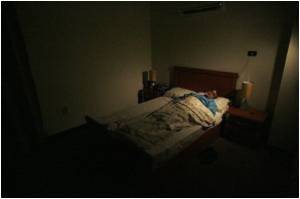Around 65% of the residents of Assisted Living Facilities (ALFs) in Los Angeles had clinically significant sleeping problems and poor sleep was associated with declining quality of life

This study looked at the sleep habits of 121 older people living in ALFs in the Los Angeles area and found that on average they slept about six hours per night and for about one and a half hours during the day. 74% had resided in an ALF for two years or less. 65% of participants were suffering significant sleep disturbance as measured on the Pittsburgh Sleep Quality Index. The most commonly reported factors contributing to "trouble sleeping" included waking up in the middle of the night or early morning (60.3%) and the inability to fall asleep within 30 minutes (59.5%).
At the initial study visit, sleeping poorly was associated with lower health-related quality of life, needing more help with activities of daily living (e.g., bathing, dressing, grooming), and more symptoms of depression. Participants were visited again three and six months later, and the researchers discovered that sleeping poorly at the initial visit predicted a worsening of quality of life, needing even more help with activities of daily living and even worse symptoms of depression.
"We cannot conclude that poor sleep truly causes these negative changes; however, future studies should evaluate ways to improve sleep in ALFs to see if sleeping better might improve quality of life, delay functional decline and reduce risk of depression," said lead author Jennifer Martin, PhD, of the University of California, Los Angeles and VA Greater Los Angeles Healthcare System.
"Our study has shown that sleep disturbance may result in negative consequences among this vulnerable group of older people. Unlike some predictors of functional decline and depression, there are established, effective treatments to improve sleep," said Martin. "These treatments have not been formally assessed within the population of older adults residing in ALFs, and future research should adapt behavioural strategies used with older adults in the community, environmental interventions used in nursing homes (like bright light therapy) and other treatments for use in the ALF setting."
Advertisement
RAS















